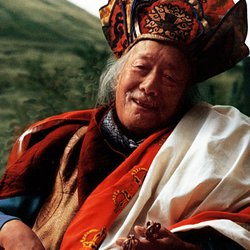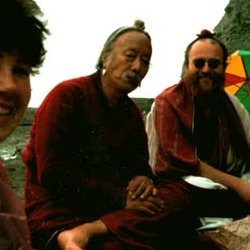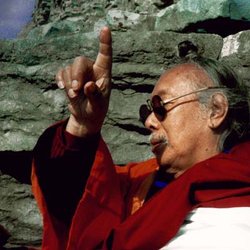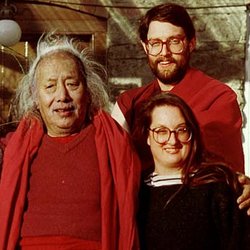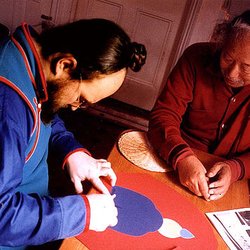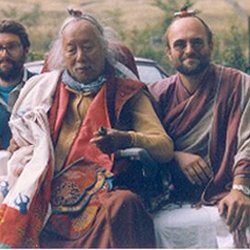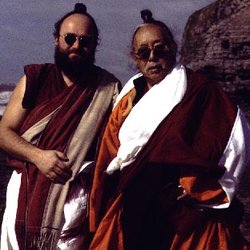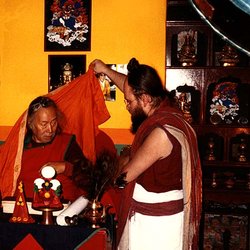It was always slightly fraught visiting Chhi’mèd Rig’dzin Rinpoche. I never quite knew what he was going to ask me – but Ngak’chang Rinpoche said: That’s really one of the finest aspect of being with Chhi’mèd Rig’dzin Rinpoche. But I was not so sure – not until later, when I learned the value of not playing safe.
In 1992 we had gone to visit Chhi’mèd Rig’dzin Rinpoche. We were having tea with him—in the tiny front room of the house in which he often stayed in the East End of London—and he looked at me enigmatically and asked: Do women ejaculate? I replied in a fumbling manner Er—yes, Rinpoche . . . wondering where the conversation might go next. It didn’t. It stopped there – but at least I hadn’t played safe. Ngak’chang Rinpoche had advised me that playing safe was inadvisable with Chhi’mèd Rig’dzin Rinpoche. Then we discussed the fact that it had been raining continuously for days, and there seemed little scope for living dangerously on that topic.
The next day Chhi’mèd Rig’dzin Rinpoche had been requested to give teachings on the Bardo Thödröl (bar do thos grol – antarabhava – Liberation Through Hearing in the Bardo from the zhi khro dGongs pa rang grol discovered by gTértön Karma Lingpa). It was at the time when one of his close disciples—Chhi’mèd Wangpo—was dying of lung cancer. Chhi’mèd was by then weak and emaciated – lying on a mattress at the back of the hall. Chhi’mèd Rig’dzin Rinpoche announced at the beginning of his teaching on Bardo: Chhi’med does not die. He then waited for what seemed a long time before saying anything. It felt as if he were waiting for some reactions form the audience – many of whom knew Chhi’mèd.
When he spoke again, the teaching on Bardo was incomprehensibly brief for most of the audience – so brief that I can still quote it: Bardo. Bardos are six: Kyé-né Bardo (sKye gNas bar do – bardo of life); Milam Bardo (mi lam bar do) bardo of dream; Samten Bardo (bSam ten bar do) bardo of meditation; Chhi-kha’i Bardo (’chhi kha’i bar do) bardo of dying; Chö-nyi Bardo (chos nyid bar do) bardo of Dharmata; Sridpa’i bardo (srid pa’i bar do) bardo of womb entry. Now you ask questions.
The audience looked completely blank apart from Ngak’chang Rinpoche who had his gaze fixed on Chhi’mèd Rig’dzin Rinpoche. Some of the audience were doing the best to pretend that they were not in the room. No question coming? The sense of embarrassment heightened as Chhi’mèd Rig’dzin Rinpoche surveyed the room. Having scanned each person present he turned to a German woman near the front: You think Chhi’mèd dies? He asked her in a matter-of-fact way. No, Rinpoche. Then he asked her why she thought that and she replied: You said that Chhi’mèd will not die. If you say he will not die I believe you. He will not die.
Chhi’mèd Rig’dzin Rinpoche shook his head slightly, in what seemed to be disbelief, and put the same question to Ngak’chang Rinpoche: You think Chhi’mèd dies? To which Ngak’chang Rinpoche—still gazing intently at Chhi’mèd Rig’dzin Rinpoche—replied I do not know, Rinpoche. Chhi’mèd Rig’dzin Rinpoche smiled and motioned to me and said: What say Sang-yum Déchen? I experienced a moment of panic. Chhi’mèd Rig'dzin Rinpoche had said Chhi’mèd would not die – yet it seemed a forgone conclusion, as far as my knowledge extended, that he would be dead within the year (and this quite apart from my discomfort at the fact that we were discussing the question of his death publicly as though Chhi'mèd were not there). Then I made the mistake of playing safe, and replied I don’t know either. He looked a trifle disappointed with my reply—raised his eyebrows slightly—but said nothing further on the subject. He then led us in chanting the drüpthab (grub thab – sadhana) from the Chang gTér (bynag gTer) lineage which related to the Bardo text – and that concluded the afternoon of teaching.
On the train journey home that evening, I questioned Ngak’chang Rinpoche about why Chhi’mèd Rig’dzin Rinpoche would choose to discuss such a subject in public (I was involved in hospice work at the time and couldn’t help wondering about Chhi’mèd Rig’dzin Rinpoche’s unique approach). Ngak’chang Rinpoche considered the question for a moment and brought my attention to the way in which the vajra master orchestrates situations appropriately for the benefit of disciples. He pointed out that there was often no way that the manner in which the vajra master discussed any topic would necessarily correspond to our predetermined philosophies. He talked about the way that the vajra master conjures with atmospheres and that every person who attended the teaching would have been affected in different ways. So . . . such a situation could not be judged in the way that I was judging it. I could understand that – but Why did you say that you did not know? I asked. Ngak’chang Rinpoche replied: I was simply being honest. If I had decided to be logical – I would have said that I thought he would certainly die. If I had decided to express my confidence in Rinpoche’s statement at face value – I would have said the opposite. As it happened I simply said the first thing that occurred to me – without complicating it. I considered that for a moment and then asked the obvious question: What would the complication have been? Ngak’chang Rinpoche smiled and replied Nihilism or eternalism. Of course. The nihilistic response would have to been to have taken refuge in my nurse training and modern medical science over the statement of Chhi’mèd Rig’dzin Rinpoche – and eternalism would have been to have taken refuge in blind faith in the face value statement of Chhi’mèd Rig’dzin Rinpoche over a decade of medical experience in which I had specialised in oncology and terminal care. So, I asked Ngak’chang Rinpoche, you really didn’t know? To which his reply was that not knowing was usually the wisest and most pragmatic option.
Later—after arriving home and feeding the dogs—I asked Ngak’chang Rinpoche whether Chhi’mèd Rig’dzin Rinpoche may have been simply making a pun on the word Chhi’mèd – which means deathless: ’chhi means ‘death’ and ’med means ‘not’. Ngak’chang Rinpoche replied, That’s more than likely. Chhi’mèd Rig’dzin Rinpoche plays with language a great deal in his teachings. For him to make a pun under such circumstances is not unlikely. Western people tend to feel that death is an extremely serious thing – rather than the end of another cycle. Of course, this did not fit a predetermined philosophy either – but I still had a question hanging in the air: So why do you think Chhi’mèd Rig’dzin Rinpoche smiled when you said that you didn’t know – but looked disappointed when I said that I didn’t know either? Ngak’chang Rinpoche smiled sympathetically and answered kindly: I think . . . it may have been the ‘either’ at the end of the sentence. I realised that I had played safe again, and Ngak’chang Rinpoche—picking up on my thought—said: It took me a long time—both with Chhi’mèd Rig’dzin Rinpoche and Kyabjé Künzang Dorje Rinpoche—before I could put everything at risk all the time.


